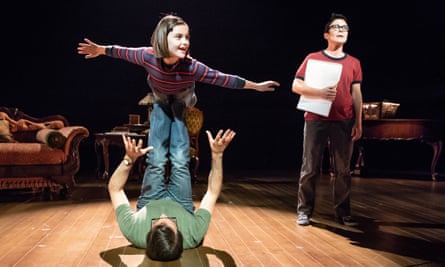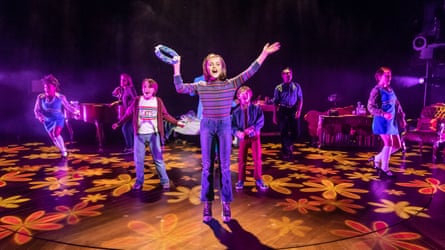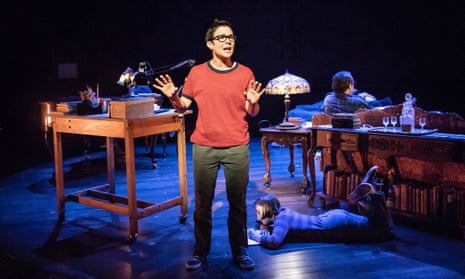Oklahoma! this ain’t. During his tenure at the Young Vic, outgoing artistic director David Lan has shown a willingness to explore new types of musical theatre. After The Scottsboro Boys and A Man of Good Hope, we now have this Tony-award winning show based on a graphic novel by Alison Bechdel with book and lyrics by Lisa Kron and music by Jeanine Tesori. If it moves one, it is because of its ability to explore the multiple mysteries of family life.
The form is a mixture of memory-play and strip-cartoon. The mature, 43-year-old Alison is on stage throughout recalling key moments from her past, which she prefaces with the word “Caption.” We see her as an Oberlin College student when she nervously comes out and then embraces her sexuality. We also see her as a young girl rejecting party frocks and identifying with a butch woman in a cafe. But at every stage her life revolves around her father who is a mix of smalltown English teacher, funeral director and house-restorer. He is also, as Alison eventually comes to realise, gay.

Bechdel described her work as “a family tragicomic”, and that ambivalence of tone is faithfully preserved in the musical. Two of Tesori’s numbers evoke a radiantly cheerful past: in one, the small Alison and her siblings leap out of a casket to belt out a jokey funeral-parlour commercial; in another the whole company dance to a finger-snapping tune celebrating the joys of togetherness. Yet the show is also about the lies and evasions that are part of family life. Even though Bruce sees himself as a broad-minded bohemian, he can never reveal his true nature to his daughter: one of the saddest scenes shows them taking a night-drive where the nearest Bruce gets to a confession is hinting they might drop into a shady bar.
What most impresses, however, is Tesori’s ability (as in Caroline, or Change) to shift musical registers. She can weave a song out of a conversational line as when the student Alison, on falling in love, buoyantly sings, “I’m changing my major to Joan.” But Tesori can also write multi-part ensembles in which the family clan explore their different dilemmas. Even my main reservation – that we don’t hear enough about Bruce’s wife, Helen – was eventually answered when she is given a heartbreaking number subverting the idea that “everything is balanced and serene” in the family home. Jenna Russell puts this across with poignancy and power.

Some questions still go unaddressed: if Bruce’s sexuality is an open secret, how come he avoids smalltown prejudice for so long? But Sam Gold’s production gives the discrete episodes a miraculous fluency and is beautifully performed. Kaisa Hammarlund, as the mature Alison, has the permanent watchfulness of the visual artist, Eleanor Kane as her student-self blossoms memorably, and Brooke Haynes shows astonishing assurance as the small Alison.
Zubin Varla as Bruce also catches perfectly the contradictions of a man who is both intellectually assertive and emotionally hesitant. But the virtue of the piece, which might be subtitled A Voyage Round My Father, is that it takes the stage musical in new directions and shows it can match the piercing directness of the graphic novel.
- Fun Home is at the Young Vic, London, until 1 September. Box office: 020-7922 2922.

Comments (…)
Sign in or create your Guardian account to join the discussion